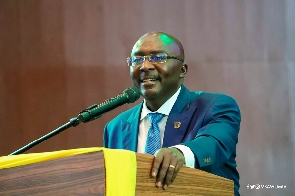BY : DARI KWABENA MATHEW (+233552376423)
The Chairperson of the Electoral Commission, Jean Mensa, has insisted that the current draft Constitutional Instrument (CI) with its provisions – including the use of the Ghana Card as the sole source of identification for voters – remains relevant to Ghana’s electoral process.
In a presentation on the draft CI’s status to parliament on Tuesday, February 28, the Chairperson maintained that the proposal seeks to promote a continuous registration of new voters, as well as cleanse the electoral system of unqualified persons.
“The CI before parliament seeks to promote the continuous registration of voters and advocates for all-year-round registration of eligible voters at district offices of the EC. It is a clear departure from the previous system wherein voters’ registration was done for a limited period.
“Like its name, under the Limited Voters Registration Exercise, the registration of new voters was only done for a limited period. It was not all year round. As such, persons who turned 18 years old after the registration period, as well as persons who had not previously registered to vote, could not do so when the time set aside for registration, usually 3-4 weeks, elapsed.
“Another significant feature of this draft Constitutional Instrument is the proposal to adopt the Ghana Card as the sole source of identification for any person who wishes to register as a voter. This implies that the guarantor system which hitherto allowed a registered voter to vouch for the citizenship and age of prospective applicants will no longer be relied upon as part of this new Constitutional Instrument,” Mrs. Mensa stated.
However, the Minority in Parliament rejected the EC’s justifications for a new CI seeking to make the Ghana Card the only identification for voter registration – saying it is prudent to also use the guarantor system.
The Chairman for Subsidiary Legislation Committee, Dr. Dominic Ayine, argued that there is no need for a new CI since the existing one used for the 2020 registration is still very potent.
Bolgatanga Central MP, Isaac Adongo, also asked the EC to wait for the National Identification Authority (NIA) to issue cards to every qualified Ghanaian before tabling the idea of a new CI.
Addressing the media, Minority Leader Dr. Cassiel Ato Forson noted that making the Ghana Card the sole document of identification is unacceptable; adding this position has a tendency of disenfranchise potential voters.
“Clearly, the proposed CI that makes the Ghana Card the sole requirement for voter registration serves as a restraint on citizens’ right to register and exercise their franchise in elections.
“The National Identification Authority (NIA), which is responsible for issuing the Ghana Card, has admitted that there is a backlog of millions of Ghanaians who are yet to be issued the Ghana Card. It is also a fact that the registration process for the Ghana Card has been characterized by several difficulties, including logistical constraints.
“The National Identification Authority has further admitted that issuing the Ghana Card is a continuing process, and therefore cannot be completed at any point in time. Therefore, making the Ghana Card the sole requirement for voter registration cannot be accepted as it will deny millions of Ghanaians their right to register and vote,” the Minority Leader said.
The Guarantor System
The guarantor system, in the past, allowed citizens to guarantee and vouch for persons to also register to vote.
This system, which is being touted by the Minority, according to the EC Chair is problematic – as it allows for people guaranteeing unqualified voters to be enrolled on the voters’ register.
She noted that the EC was compelled to use the system because, in the past, there was no national identification document such as that Ghana Card.
“Over the years, the guarantor system has presented us with several challenges. Unfortunately, we were unable to discard it much earlier due to the absence of a national identification document such as the one issued by the NIA. The challenges with the guarantor system are two-fold: it opens the door for registered voters or guarantor contractors to guarantee and vouch for persons who are less than 18 years. Secondly, it allows the guarantors to vouch for persons who are not citizens. Such unqualified persons use the guarantor system door to try to get onto the register.
“Truth be told, the guarantor system was not the best under any circumstances; but we did not have other options since a significant number of persons did not possess the Ghana Card at the time of registration in 2020.”
Mrs. Mensa further indicated that in 2020 it cost the EC to rid the register of minors and foreigners, by establishing District Registration Review Committees (DRRCS) which worked several days and weeks in all districts to expunge the names of 40,000 minors and foreigners from the register.
“Using the Ghana Card as the sole means of identification will prevent foreigners and minors from getting onto our Voters’ Register. More especially, it will prevent unqualified persons from influencing our elections and having a say as to who should govern our country. This is an issue that borders on the sovereignty of our nation. We do not believe that we will disenfranchise persons by enforcing the policy requirement of using the Ghana Card to prove one’s eligibility,” she maintained.
Ghana Card will not be used to vote in 2024
Meanwhile, the EC Chair has also clarified that the Ghana Card is only a mode of identification, and not the card that will be used for voting in the upcoming elections next year.
“I wish to emphasise that the Ghana Card will not be used to vote in 2024. The Ghana Card is only a requirement to register as a voter. Once you present your Ghana Card and successfully register as a voter, you will be issued a Voter’s Identification Card that bears the code of your region, district, electoral area, and polling station. The Ghana Card does not have these features. It will not be used to vote in the 2024 General Elections,” she stated.
Holders of the Ghana Card
According to the EC Chair, some 17 million Ghanaians have registered for the Ghana Card, with 16 million Ghanaians currently in possession of the card.
“On the strength of these numbers, we are convinced that the 1.5 million applicants we are expecting to register by the end of 2023, following the last registration exercise in 2020, are likely to already possess the Ghana Card,” the EC Chair added – encouraging those who do not have the card to begin the process of acquiring it to enable them register as voters.
Additionally, since the card is acquired at the age of 15, Mrs. Mensah also encouraged persons who will turn 18 in 2023 or 2024, and are interested in voting in the country’s elections, to visit the nearest NIA registration centre and register for the Ghana Card to enable them also register as voters when they become eligible.
She also called on the NIA to accelerate the pace of printing Ghana Cards to make it easy for anyone who is interested in registering with the EC so.
NIA’s readiness
The Executive Director of NIA, Professor Kenneth Attafuah, in his presentation to parliament reiterated his outfit’s readiness to print more Ghana Cards.
His position however came with conditions, urging the Ministry of Finance to fulfil its mandate of providing adequate funding to facilitate the NIA’s work.
“The NIA has the technical and operational competence to print and issue the cards. We are ready to deliver on this important mandate.
“However, the attainment of this goal also depends on the fulfillment of a number of conditions precedent.”
With respect to the integration of NIA’s database with the EC, Prof. Attafuah further told the House that using the Ghana Card in the voting process will, among other benefits, help eliminate the cost of periodic voter register compilations; eliminate concerns of voting fraud; eliminate duplication of voter IDs; and cleanse the register of deceased persons.

 Business2 years ago
Business2 years ago
 Politics2 years ago
Politics2 years ago
 News3 years ago
News3 years ago
 Politics1 year ago
Politics1 year ago
 News3 years ago
News3 years ago
 Business2 years ago
Business2 years ago
 National1 year ago
National1 year ago
 Media2 years ago
Media2 years ago
